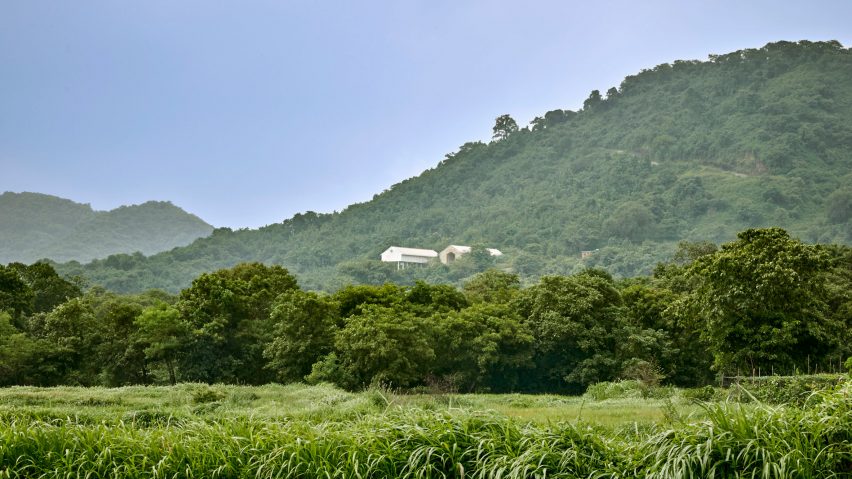Indian studio Architecture Brio has created a holiday home topped with two gabled, timber structures perched on a hillside overlooking Mumbai Bay in India.
Named The Ray, the 1,800-square-metre holiday home in Alibag was designed by Architecture Brio to take advantage of the site's prominent, hillside location.
"We knew at the outset this house would have a strong presence due to its large program and the fact that it was sitting atop a hill that is visible from afar," said Architecture Brio founder Shefali Balwani.
"Rather than fighting this we tried to find alternative ways to settle into the landscape," Balwani told Dezeen.
"We worked with the idea of terracing and wrapping both the building and landscape with stone walls that emerged from the land, the walls being shorter or taller as the program demands," he continued.
"This gave the home the feeling of being a lost and found ruin."
The home was embedded into the hillside with natural stone visible on the lower floors. A stone base built from hand-cut limestone stands on top of the natural base, which supports the two gabled pavilions.
One pavilion was enclosed in louvred facades, while the other was made from stone.
"The site offers truly spectacular views, providing a panoramic vista of Bombay Bay and the vast ocean beyond," explained Balwani. "But we wanted to avoid making this house all about a single mega-panoramic gaze."
"When envisioning our design, we saw the two linear forms as akin to telescopes, expertly framing these breathtaking views."
The timber-clad pavilion contains the holiday home's main living space, which opens out onto a sheltered terrace that is surrounded by a swimming pool. The stone block contains a series of bedrooms topped with a principal suite with views across the bay.
Throughout the home, the studio aimed to utilise local materials and craftspeople.
"In this project, apart from the core structure and the striking metal standing seam roof, virtually every element of the home has been meticulously handcrafted," said Balwani.
"This dedication to craftsmanship is evident in the intricately hand-cut limestone walls, the expansive sliding steel windows, the reflexology pebble bathroom floor, and even the boulders discovered on-site, transformed into distinctive bathroom basins by skilled Rajasthani artisans," he continued.
"These elements have been integrated with a contemporary sensibility, departing from the traditional context in which these artisans typically work."
The studio also reused and repurposed numerous boulders found on the site, some of which were left in situ, while others were repurposed as basins.
"The hill upon which the house is situated is naturally rugged and rocky, and we anticipated encountering numerous boulders during the excavation for the foundation," said Balwani.
"Some of these boulders we deliberately chose to leave exposed in their natural state, carefully smoothing and finishing their surfaces, while others were thoughtfully repositioned and repurposed, such as the one near the pool, which now serves as a basin to collect rainwater."
Although the holiday home is large, the studio aimed to differentiate it from other nearby homes that it described as "self-important villas".
"We embrace an architecture characterised by humility," he explained. "This is an architecture that doesn't seek the spotlight but rather values its integration into a broader context, where it becomes an integral part, shaped and enriched by its surroundings."
"In this project, we have meticulously planned most of the aspects. However, we've also intentionally introduced an element of unpredictability in the interplay between architecture and the surrounding landscape," he continued.
"While we guide this process, we like to envision that over time, nature and architecture will become increasingly intertwined in their coexistence."
Based in Mumbai, Architecture Brio was founded by Balwani and Robert Verrijt in 2006. Previous projects by the studio include a concrete weekend retreat that straddles a stream in Alibag and an artist's cabin on stilts.
The photography is by Ashish Sahi.

